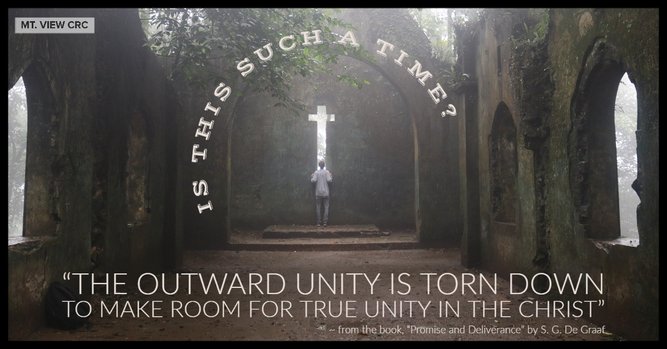 I’ve always been fascinated by the story of the Tower of Babel. Found in Genesis 11, it’s an account of how all mankind gathered to build a city and tower from which they can stay connected and meet with the gods. Now, I cannot think of that story without also thinking of seminary. Much time has passed since I graduated, but I constantly reiterate to my wife, Syd, that the best thing I ever learned in those years of intense study was how little I actually knew. The professors would warn us against “knowing just enough of the Bible to be dangerous”. Regarding the Tower of Babel, I would have readily told you it was a tale about reaching the heavens with little more application than to say, “God judges foolish decisions”. It is, on the surface, not an incorrect assessment of the situation: God did judge their foolish decision. Yet it takes into account nothing more than a surface reading of those 9 short verses. As such, armed with a knowledge that my knowledge is lacking, I came to a book called, Promise and Deliverance to read again Scripture as a story about Jesus. Yet this time, it caused me to look at everything in a new light, for the author wrote of God’s judgment at Babel, “The outward unity is torn down to make room for true unity in the Christ”. Suddenly, I realized the story wasn’t about judgment for judgment’s sake. Rather, it is one of grace. That is, the backbone involves seeing the twice-given cultural mandate of God to spread across the world and multiply His image through marriage and children set against the people at Babel clumping and staying. The people’s decision was – whether conscious on their part or not – a direct rebellion to one of God’s oldest and most foundational commands, and it came at a price: when we rely too much on each other, there results in little reliance on a God who operates most readily in the wilderness. That doesn’t mean that we are better off alone – quite the opposite. Rather, if you look again at DeGraaf’s assessment of Babel, he says, “The outward unity is torn down”. Why? – “In order to build true unity in Christ”. That is, in the judgment at Babel, the Lord brought upon the wonders of culture and new languages, but His purpose was to cause the people to rely on something greater than themselves: the promised Seed of Eve (Genesis 3:15). Not only that, but immediately after the scattering of the people, the Lord begins piecing together His eternal family through Abraham (Genesis 12). Where He scattered thousands of years ago at Babel, He was preparing to gather in at the cross (John 12:32). The momentary pain was yielding eternal fruits, because should God have allowed the outward unity to stand, an inward unity that you and I now share in Christ could never have been found. That is, unless the Lord broke the reliance on the tower, the city, and each other, we would never have found His hand reaching for us in the darkness. Here’s the reason I bring that up: Continued...
8 Comments
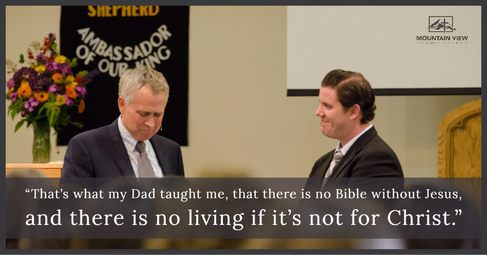 My Dad has taught me many things. Top of the list is that Dad jokes are real, and they’re painful. He is a sucker for puns, loves turns of phrases, and never passes up an opportunity to tell a “joke”. (I put that in quotes because we’re stretching the definition there). When my next oldest brother and I were younger and would play sports or chess or something that wasn’t necessarily up his wheelhouse, he had the same line locked and loaded when conversing with another parent. He would say, “Yup, I taught them all I know”. Of course, the subtlety of the humor was not that he taught us what we knew but rather what he knew – which, in those fields, wasn’t all that much. It’s one of the reasons why Sydney and I have taken to calling him “shameless”, because he doesn’t seem to care all that much what others think of him – and the puns are proof of that. There are many things my brothers and I were interested in that was out of Dad’s area of expertise, but the greatest thing I ever learned from my father was indeed something about which I knew nothing and he taught me all that he knew. Of course, should he take time to read this, he’ll probably be a little caught off guard, because it wasn’t something he necessarily sat down to explain, but it was a lifestyle that I pray daily to emulate. But to tell you what it is, I’ll explain it backward by sharing one of my biggest struggles as a pastor and a Christian. Continued... 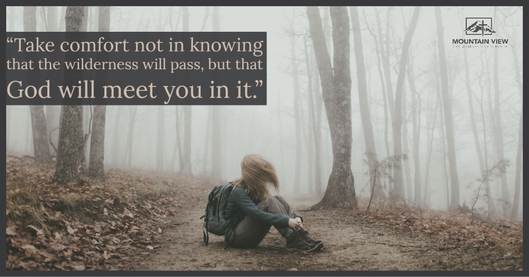 With the news that mid-April will see the peak of impact from the virus, it feels like everything is starting to hit a bit harder. People are losing work, and the goalposts continually shift. We don’t know if the news is trending good or bad or somewhere in-between because no one really knows anything. It’s a terrible place to be, and yet it’s paradoxically also the place where the best things begin. How can this be? – It’s because everything is going down right now – employment, income, milk and gas prices, moods and hopes – and when things go down, people usually start to look up. That’s why so often in the Bible we see God bring His people into the wilderness. In fact, that’s really where the story of fallen humanity begins, as they are driven from a garden and into the wilderness. It’s also a place where many of the stories of the Bible take place. Why? – Ask yourself: when do you feel closest to God? Is it when all your ducks are in a row and life is churning along as you desire? Probably not. God feels closest in hospital-rooms, when we’re oppressed, scared, lonely, and desperate. That’s why the wilderness is so prevalent in the Bible. It’s where God wrestled with Jacob and Israel was born. It’s where He met Moses to raise up the leader to bring Israel from slavery. It’s where the nation of Israel was brought immediately after slavery and before entering the Promised Land. It’s where David was forced to flee from Saul and then Absalom, penning beloved Psalms. It’s also the place where Jesus was first called when his ministry began, and where he was tempted by the devil. God operates in the wilderness, because it’s the one place in this world where we get downright desperate. It’s where the words of the Psalmist become our words: “As a deer pants for flowing streams, so pants my soul for you, O God” (Psalm 42:1). And, “O God, you are my God; earnestly I seek you; my soul thirsts for you; my flesh faints for you, as in a dry and weary land where there is no water” (Psalm 63:1). The wilderness is the place where the black and white words of Scripture begin to ooze with color, coming to life as we don’t simply feed the mind but the soul. It’s the place where we can’t distract ourselves with the things of this world nor take them for granted. It’s the place where God takes us so that He can get our attention, because it’s the one place we can’t survive without Him. Desperate times produce desperate prayers. Continued... 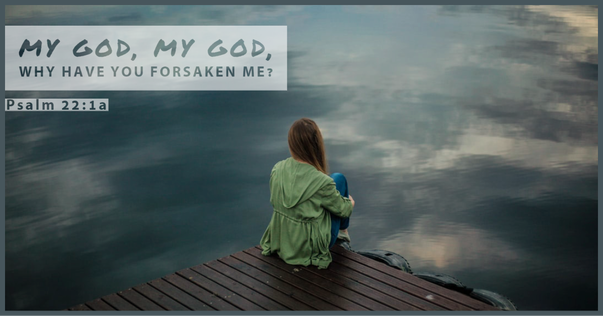 I don’t know about you, but I have difficulties praying through pandemics like these. The reason is not because I doubt God’s plan (though at times I do), nor is it because I’m unsure of what I want. Rather, it’s because I’m always uncertain if what I want is what God wants. After all, with the coronavirus’ fallout, do we simply pray that it ends, everyone returns to work, the economy roars, the churches meet, and life goes back to normal? That’s a laudable thing to desire, but then why did God bring this on us? Or, on the flip side, do we pretend to be such delightfully good Christians that we simply say, “Lord, you’re in control; I get that. We deserve your wrath; I get that. So let your will be done and not mine”? On one hand we can become heartless theologizers as we say, “Dust begets dust, so do as you please”. Or, we become so attached to our spoiled way of living that we say, “Lord, how can you be good when we’re struggling?”. We might really wrestle with this, but I also think that’s the point: we’re meant to wrestle. Look at Jacob in Genesis 32, look at what “Israel” means, or look even at Jesus in the wilderness. Christianity is not some guide map on easy living; it turns everything we know upside-down, challenging our norms and desires. It’s a constant battle between old and new natures (Romans 7), with the journey always meant to reshape us in the likeness of Christ. You see, there’s a tension between God using everything at His disposal to bring about His purposes while also caring about each atom in this world. The tension of how those go together is a great mystery, so how do we walk through it? – The answer is lament. Continued... 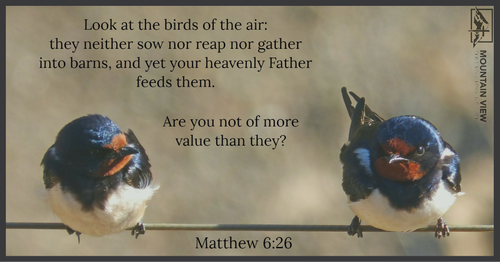 I know, I know; we’re all sick of talking about the coronavirus. My heart especially goes to those who now have young children at home, whose paychecks are uncertain, and those who are at higher risk. Yet the one thing we all have in common at this point is that like it or not, you’re thinking about COVID-19. I’m sure everyone who reads this is trying to get away from the news as we post funny pictures on Facebook and simply want to think about anything other than the sheer uncertainty of tomorrow. As I try to do the same, however, a conversation I recently had with my father continues to come to mind. It was several weeks ago, and we were discussing how to practically apply the Bible to our lives. He then said something I’ve never seriously considered. He remarked, “We get so caught up in this world that we never have to consider the sovereignty of God”. My goodness, did that hit close to home. Continued... 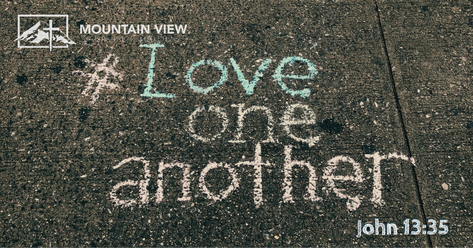 One of the questions with which many of us have been wrestling lately is: should we still meet on Sunday? Now, I am not speaking on anyone’s behalf or in response to anyone, for I have talked to several people – pastors and others – who are wrestling with this same question, and the responses are varied though tend toward caution. Here at Mt View, we as a Council decided that the best course of action was to temporarily suspend Sunday services, and here are my personal thoughts – and not necessarily the Council’s – on why. First, the government encouraged us to do so. Now, if the government put out a message telling us to stop meeting for religious purposes, we would rightly ignore that. When it comes to matters of health and safety, however – wherein nearly every religion, business, and meeting place is given the same directive – to make this a matter of us versus the government is to read persecution into a situation where it doesn’t exist. We have not been singled out; instead, we as Christians have been asked to show love by helping to slow the spread of the virus. That’s something that I can get behind and support, even if it means adjusting to a new normal for a while. Regarding whether or not we should continue to gather publicly, the Lord can and does perform miraculous works, but He’s a God of order. Thus, He works most commonly through systems, and governments are the systems He has put in place. It does not mean they do not err, and it does not mean they speak with the voice of God. However, it does mean that we are subject to them in matters that do not compromise God’s glory. Here are three examples from the Bible: Continued... 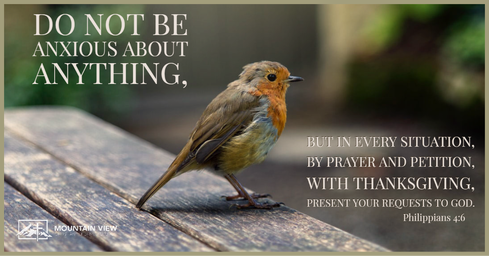 As we sit in the middle of the panic of coronavirus, I think it’s important to remember the words of Psalm 121:1-2, “I lift up my eyes to the hills. From where does my help come? My help comes from the Lord, who made heaven and earth”. Whatever your thoughts on the current situation in this world and in our country, the reality is that we are all now feeling the effects of this virus. Businesses are taking hits, children are home from schools, seniors may fear infection, and all are wondering what happens next. In that way, we must remember that our help comes from the Lord only. Yes, He works through governments and systems, but if this virus has proven anything, it’s that humanity is mortal – and we know it. All of history has built to the systems we now have in place, and yet they are crashing as the coronavirus spreads across the world. So whether panicked or not, stocked up or needing to shop, remember that your help comes from the Lord. With that in mind, here are some thoughts on how to proceed. Continued... |
AuthorMy name is Bryan Lanting. I am a graduate of Reformed Theological Seminary, and I am presently serving Mt View CRC as their pastor. I am married to a wonderful wife named Sydney, and both of us are loving life, loving Lynden, and loving the Lord! Archives
October 2021
Categories |

 RSS Feed
RSS Feed